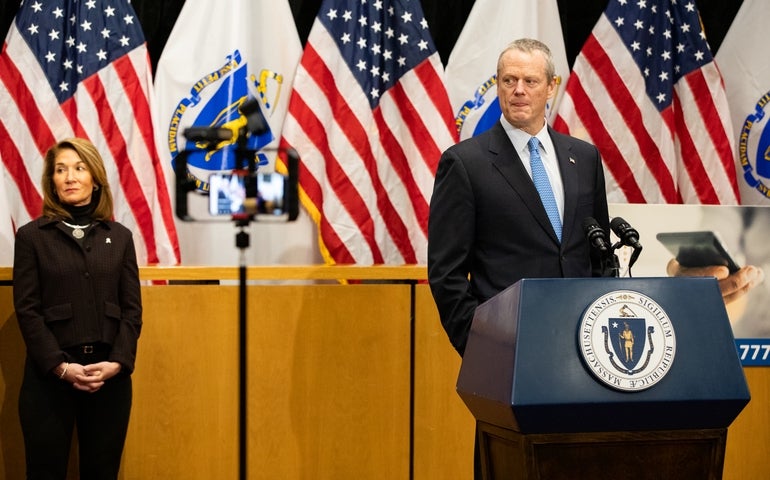Forced economic shutdowns and social distancing in Massachusetts have contained the coronavirus to the point where an infected person is now, on average, spreading the virus to less than one other person, business leaders said Friday, and that metric will be a key part of any economic re-opening.
During a Massachusetts High Technology Council presentation Friday morning, business leaders said the Rt for the coronavirus in Massachusetts — a measure of a virus’s average transmission rate at a given point in time — is down to roughly 0.90 from just over 1.50 in mid-March — meaning each case of infection can be expected to lead to 0.90 other cases of infection on average.
“The good news is that we’ve actually reduced the transmission rate … the critical point is [Rt] 1 to start to see the flattening of the curve and beating the virus, we’re now at 0.9,” Megan Greenfield, a partner at McKinsey and Co. who worked alongside Bain Capital co-chairman and co-owner of the Boston Celtics Steve Pagliuca to help develop the MHTC framework, said. “The bad news is that we shut down the entire economy in order to do that. So the real focus here is how do we re-open the economy to get more economic activity while keeping the rate of transmission at less than [Rt] 1.”
The MHTC framework released last week was developed by some of the state’s top health and life sciences business leaders to propose ways for the state to fully recover from the coronavirus outbreak and begin to open its businesses.
The framework centers around aggressive testing and support for new COVID-19 treatments until a vaccine can be developed, and is built around the idea that the state must “dynamically” model hospital capacity in real time to be able to track how steps toward re-opening affect the spread of the virus.
With those structures in place, the MHTC envisions a phased and segmented reopening starting with sectors that can adequately protect its workers and customers, and with younger workers who are at lower risk for serious health complications from COVID-19. The council presented its framework this week to Lt. Gov. Karyn Polito and the re-opening task force she is leading.
Pagliuca said one of the most critical parts of any economic re-opening will be masks and a “thoughtful mask program” that can deliver masks to citizens and explain the most effective ways to wear a mask.
“When you are in closer spaces you definitely have to have that mask on. I’ve had meetings with companies in Japan where they are coming into the office, they’ll have six people and they take mass transit — every single person has a mask [on] inside and outside. They use it, basically, religiously and it seems to be having an impact,” Pagliuca said. “I spoke to several of the presidents of hospitals here, CEOs of hospitals, and they’re experienced with everyone wearing a mask at all times in the hospital. They’re seeing very low transmissions … most of their cases are coming from when people go home or are out in the street and not wearing the mask.”
Gov. Charlie Baker has previously said that masks are going to become a more regular part of daily life in Massachusetts as people start to get back to work while the virus continues to spread.
“I certainly believe that, whatever the rules of the road look like for reopening, masks and face coverings are going to be a big part of it,” he said last weekend. “Have to be.”
On Friday, after the tech council presentation, Baker announced he had signed an executive order requiring everyone in Massachusetts to wear a face covering when they go out in public, putting added strength behind what had only been a recommendation up until this point to reduce the spread of the coronavirus.
Baker described masks as a necessary part of what will become the “new normal” as the state begins to think about how to reopen businesses and prepare for more people to start using public transportation.
Pagliuca and Greenfield discussed other possible changes to normal routines or practices that could help restart some business or social activities during the pandemic. In particular, it would be difficult to both require universal face coverings and also allow people to dine out at restaurants.
“There are innovative approaches that you can take. For example, in South Korea they have plexiglass that is a three-sided protection around you, as well as facing everyone in one direction to mitigate the impact of forward projection of your breath,” Greenfield said.
Colleges might consider moving large lectures to an online format in the fall and then allowing smaller classes to meet in large lecture halls so students and instructors can remain spread out, they said.
And for mass transit, Pagliuca said the “key is to limit capacity,” which could be especially difficult on an MBTA system that has recently struggled to meet demand.
While Massachusetts may still be weeks away from re-opening — Baker’s latest shutdown order is in effect until at least May 18 — Greenfield noted that other countries and other states are already beginning to re-open, which means Massachusetts should soon have some data it can assess before diving into any one re-opening plan.

